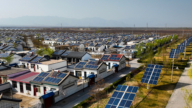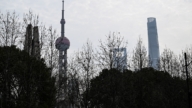【新唐人2013年08月29日讯】今年以来,中国地王大战遍地开花,北京新地王的楼面单价已经高达4.4万元/平方米。仅上半年,北京土地总收入就超过了664亿元,如果把北京土地全部变卖就会远超美国一年的GDP。目前,中国“鬼城”越来越多,很多地方房屋空置率也很高,但地王价格却再创新高,造成这种怪象的背后原因是什么呢?请看报导。
中粮地产7月23号以23.6亿拍下北京市孙河乡的一块地,它们次日发布公告,这块地用地规模75359.79平方米,建筑控制规模81716平方米。
根据业界测算,扣除保障房面积后,这个地块的楼面单价高达4.4万元/平方米,成为北京新单价地王,远超原来的2万多元/平方米的单价。也就是说,在北京一个小指甲盖儿大小的地都能卖到4块多。
从整个中国来看,号称是“地王年”的2009年、2010年与2013年相比,简直就是小巫见大巫:不仅仅之前的地王价格峰值屡被突破,而且从数量上也是差的很远。
北京市土地面积为16410.54平方公里,而上半年土地均价为8167元/平方米。假如将北京市土地全部变卖,可以卖到134万亿元人民币,远超美国100万亿的一年GDP总值。
美国南卡罗莱纳大学艾肯商学院教授谢田:“造成这种荒谬的原因,其实至少有两个,一个是中共政府继续的乱印钞票、烂发货币,造成中国严重的通货膨胀。这是造成中国土地价格和房地产价格迅速飙涨的表面原因。”
美国南卡罗莱纳大学艾肯商学院教授谢田进一步指出,造成这种怪象的背后原因是,中共权贵利益集团利用土地泡沫、利用通货膨胀席卷中国老百姓的财富。
实际上,据《中国经济周刊》旗下的智囊机构“中国经济研究院研究”显示,今年49个地王中,有将近一半的地王是被有央企背景的大型房企夺得。
北京师范大学MBA导师段绍译:“它们只是名义上的企业,实际上相当于政府的一个部门。按着美国著名经济学家弗里德曼的说法,国企办投资是花别人的钱,办别人的事,它是既不讲效果又不讲节约。”
全球最大的空头基金尼克斯掌门人、做空大师詹姆斯•查诺斯日前接受日本媒体采访时表示,中国当下的房地产热酷似1980年代后期的日本,巨大的房产泡沫规模无疑将载入历史,并将对中国的实体经济和金融体系产生沉重打击。
查诺斯通过计算推测,从建设成本来看,中国房产市场的价值已升至GDP的300%~400%,而1989年日本的这一比例为375%。
段绍译:“中国的房价泡沫非常严重,我预期,在未来两年之内,这个泡沫应破灭。”
经济学者段绍译认为,当局通过人为的干预市场、垄断土地获利很多,但这是不能持续的。泡沫一旦破灭,房产投资者会血本无归。
8月27号《日本商业报导网》发表题目为《向“鬼城化”急速迈进的中国》的文章。文章指出:“鬼城”迟早会在中国大规模出现。并且由于一些地方政府在开发时并未进行正确评估,许多地方出现不良债务,严重影响到地方经济。
谢田表示,中共控制了所有的银行、金融体系,老百姓储蓄的钱都流入了央企和国企,它们不顾已经出现了几十个“鬼城”,还在推高房地产泡沫。实际上,受害的只是老百姓。
采访/易如 编辑/宋风 后制/葛雷
Beijing Land Prices Break All Records – Exceeding USA Annual GDP
Sky-high land prices are all the rage everywhere in China.
Beijing Xindiwang the real estate unit price reached
44,000 Yuan ($7,000) per square meter.
In the first six months, revenue from land sales in Beijing
exceeds 66.4 billion Yuan ($11 billion).
If Beijing sold all its land, it could generate a total amount
that is far exceeds the US annual GDP.
There are more and more ghost cities in China,
In many places the housing vacancy rate is very high.
However, land prices have increased to a record-highs.
What’s the reason behind this? Let’s take a look.
On July 23, Cofco Property spent 2.36 billion
Yuan ($385million) to buy land in Sunhe, Beijing.
Next day, they announced that the Sunhe plot has
an area of 75,360 sqm, the building area is 81,716 sqm.
Experts calculated that after deducting
the low-income residential zones,
the rest per unit price is 44,000 Yuan ($7,000) per
square meter which sets a new record for land prices.
It far exceeded the original price of 20,000 Yuan ($3,260)
per square meter.
It means that in Beijing, even a small fingernail-sized
area can be sold for more than 4 Yuan ($0.65)
In 2009 and 2010, land prices reached a record high,
but compared with 2013, it’s nothing.
The previous records are being constantly outstripped,
the numbers are astonishing.
In Beijing, the total land area is 16,410 square kilometers.
In the first six months, the average land price
was 8,167 Yuan ($1,334) per square meters.
If Beijing sells all its land, it can be sold for
134 trillion Yuan ($ 22 trillion),
which is far higher than the US annual GDP,
of 100 trillion Yuan ($16 trillion).
Xie Tian, Professor at Aiken School of Business,
University Of South Carolina: “At least two reasons caused this ridiculous phenomenon.
The CCP’s irresponsible printing and issuing of bank notes,
led to runaway land inflation.
This is the surface reason that has caused land prices
and housing prices to soar so quickly."
Xie Tian said that the CCP’s elite interests groups used the
land bubble and inflation to steal civilians’ wealth.
Actually, according to China Economic Weekly’s think tank,
research, amongst 49 record-high land prices,
50% of them are purchased by state-owned monopolies.
Duan Shaoyi, MBA tutor in Beijing Normal University:
“On the surface they look like free enterprises,
but in actuality they are the equivalent of
a governmental department.
According to famous US economist Milton Friedman,
state-owned enterprises take other people’s money,
and take other people’s business, and they are neither
economical nor efficient, nor interested in saving."
James Chanos, an American hedge fund manager and founder
of Kynikos Associates recently told Japanese media that
currently, Chinese real estate is very reminiscent of
Japan in the late 80s.
This is going to be one of the biggest bubbles of all time.
This will have a real impacts on the
Chinese banking system and the economy.
Chanos calculated and speculated that the value of all
residential real estate in China at construction cost is 300-400%
of GDP. It was 375% in Japan in 1989.
Duan Shaoyi: “China’s real estate bubble is very serious.
I speculate that the bubble will burst in the next two years."
Duan Shaoyi said that the authorities manipulated the market,
monopolized land to gain lots of personal advantages.
But this is not sustainable. Once the bubble bursts,
real estate investors will lose everything.
On August 27, Japanese media published an article
about “ghost town" China.
It said ghost towns largely appeared in China, because local
governments didn’t properly plan for development.
Many places are distressed because of debt,
seriously devastating the local economy.
Xie Tian said that the CCP controls all the
banks and financial sectors.
People’s deposits are siphoned off into central
and state-owned enterprises.
Ignoring the scores of ghost towns,
they are still creating more and more real estate bubbles.
But in actuality, only the civilians
are suffering and afflicted.




























